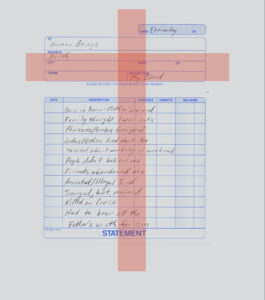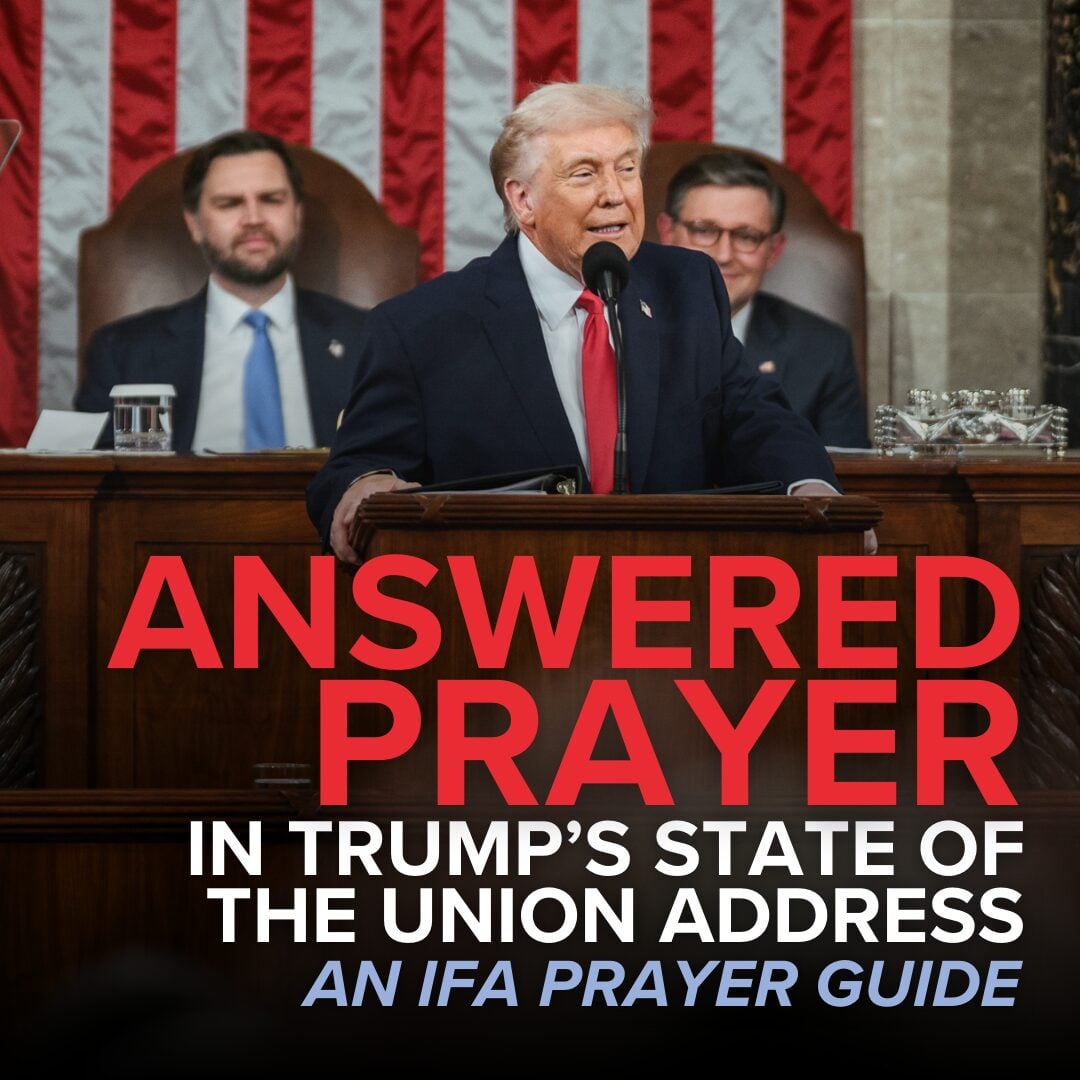Spiritual Prep for Christmas
Trump Taps LA Governor to Serve As Greenland Envoy
Police Threaten Arrest Over Christmastime Evangelism: First Liberty
Bill Clinton Appears in Latest Epstein Files Release
Gabbard Calls Islam the Greatest Threat to Our Freedom
Spiritual Prep for Christmas
Are you dreading family get-togethers this Christmas? Did you just barely get through Thanksgiving? Did the family festivity become a family feud? If so, you are not alone.
Last year, the big divide between family members probably centered on the presidential election. This year, Thanksgiving may have cut on the vaccine issue. And Christmas —well, who knows what a month might bring in terms of mine fields? But there’s hope!
Pray for your fellow intercessor.
I’ve learned three simple, though not easy, steps to freedom at family feasts. And this freedom is, not surprisingly, found in the blood of Jesus. Only His blood heals. So situations of strife require the blood to be applied — in repentance or in forgiveness, and often in both.
If you are like me, you may store up a few grievances in your heart against others — especially family members who have that unerring ability to push the button calling down the nuclear strike. I call these grievances “You Owe Me’s.” They accrue when someone sins against us and we store that sin instead of forgiving it. And we let it pile up into a mountain — or even a molehill — of debt. Sometimes the grievance stems from sin, but sometimes it arises from an offense of which the other person is blissfully ignorant.
Regardless of the type of infraction, we are called to forgive. Matthew 18 makes this abundantly clear. Jesus is teaching His disciples here (the Church, that is) how to forgive. Over the years, I’ve applied this same three-step process to forgiving those who are not yet believers, as well.
Step One: Forgiveness starts with confronting sin.
Matthew 18:15 shows us sin — especially in the Church — needs to be addressed: If your brother or sister sins, go and point out their fault, just between the two of you.”
The whole of this Scripture is worthy of study, but for the purposes of forgiveness, Jesus teaches we need to confront sin.
We must acknowledge we were sinned against. Sometimes, I prefer to ignore the offense, which can be ( and often is) a godly choice. But this choice becomes sin if I just let it lie like a festering bullet in my soul. That wound usually becomes infected, gathering other sin around it like pus.
I may not confront the offender with every sin or offense. Sometimes my doing so would actually lead that person into sin. Or perhaps the sin I’m addressing came at the hands of a person now dead or even dangerous to me. But I do confront the sin with the Lord.
Step Two: Forgive through prayer.
Just as Jesus did on the cross, we forgive by asking the Lord to do the work. We do the asking; He does the forgiving, just as Jesus encouraged in His teaching on prayer.
Forgiveness is not, nor does it require reconciliation. In fact, it may be unwise or impossible to reconcile. Reconciliation requires two willing parties; if the offender is dead or dangerous, reconciliation is impossible.
Forgiveness, though, is required for our relationship with the Lord.
In fact, perfect forgiveness is possible; it entails forgiving the debt.
Step Three: Forgive the debt.
In Matthew 18:21–22, Peter asks Jesus a telling question: “How many times should I forgive my brother or sister — up to seven times?” Because rabbis of the day taught that forgiving someone three times was plenty, Peter may have thought himself quite generous by proposing to forgive seven times!
But Jesus picks up on Peter’s use of the biblical number for perfection, saying there is no limit — 77 times! — to the number of times you forgive another person. In fact, He shares a picture of perfect forgiveness in the parable of the unmerciful servant.
That story in Matthew 18:23–35 tells of a servant who owed his king an impossibly large sum of money. The servant begged for mercy from the king, who extended it by cancelling the debt. After this, the servant came upon a fellow servant who owed him a comparatively small amount of money. Instead of showing mercy, the first servant had the other thrown into prison until he could pay the debt. This outraged the other servants, who ratted the first servant out to the king. Because of the servant’s harshness, the king dealt harshly with him.
This parable is rich in lessons we can’t explore here, but one point Jesus is making is that perfect forgiveness requires writing off the debt that is owed to us. We need to mark our “You Owe Me’s” paid.
Jesus did this on the cross. He kept no record of wrongs. He has no “You Owe Me’s.” If He did, the invoice might look like this:

Instead of enumerating debts we can’t pay, Jesus chose to forgive. As He was dying, He gasped out the word, which in Greek is tetelestai, meaning “It is finished.”
This was also the word written on invoices to indicate the bearer had paid his debt in full. Jesus’ payment covers all the “You Owe Me’s” we are carrying too.
Walking the Steps
When I first started clearing debts — dealing with the “You Owe Me’s” of a lifetime — I would write down the initial offense on a piece of paper. Then I would ask Holy Spirit to help me understand how this sin had affected my life. The effect or “debt” usually lay in my sinful or unhealthy reactions to the original offense. I wrote these “debts” down on the paper in a second column. Sometimes I had several pages of such debts.
For example, I once had a “You Owe Me” related to certain tasks I had done. The reaction of people to my inadequate performance was not pleasant. I felt sinned against by their reaction, but I also stored up some debts. Among these:
Because of the reactions, I became anxious about those tasks and other things.
Because I became anxious, I became a perfectionist.
Because I became a perfectionist, I was rarely content.
Because I was discontented, I became embroiled in all kinds of idolatry trying to allay anxiety and find happiness.
This maladaptive behavior (sin, really) stemmed from my response to the unpleasant reactions to my performance on the tasks. I had debt — pus, if you will — gathering around that first wound.
I have found the required honesty in the first step to be one of the more difficult parts of the process. I didn’t want to believe I could be so petty as to hold certain things against other people or family members.
“She didn’t say hi.”
“He seems to like that person more.”
“They all forgot my birthday!”
Sometimes the situations that launched a “You Owe Me” did not seem to require forgiveness, but my responses to them certainly did. I needed to face up to the sin those moments kicked off in me. Then I would ask the Lord to forgive me, the original offense (including the people involved), and the debt. And I would mark it paid! By the blood of Jesus!
This year, many of my “You Owe Me’s” have focused on ill-advised presidential election votes. The debt associated with those votes is accumulating daily, as IFA intercessors know. So I’m regularly walking these steps. Yes, it takes time and tears, but I’d rather do the work now so that I can enjoy — rather than stew through — my Christmas meals with friends and family.
Dear Lord, teach us to acknowledge sin and offense quickly so that we might forgive and allow sin to be covered by the blood of Jesus. This way it does not accrue. But if debt has accrued, please help us identify it so that we can forgive and release the debt. We desire to have no “You Owe Me’s” in our hands. Forgive us our debts even as we forgive our debtors. Set us free to enjoy our families and friends this blessed season. In Jesus’ name. Amen.
Are you struggling to forgive an offense? Why not pray it through right now, below?
New York City–based Joyce Swingle is an intercessor and a contributing writer for IFA. With her husband, Rich, also a contributing writer for IFA, Joyce shares the gospel of Jesus Christ around the world through theater, speaking, writing, and film. Prior to going into full-time ministry, Joyce worked for about 20 major magazines and now works in pastoral ministry and Christian counseling. Read more about Joyce’s work at www.Richdrama.com. Photo by Gavin Tyte on Unsplash.
Partner with Us
Intercessors for America is the trusted resource for millions of people across the United States committed to praying for our nation. If you have benefited from IFA's resources and community, please consider joining us as a monthly support partner. As a 501(c)3 organization, it's through your support that all this possible.


We use cookies to ensure that we give you the best experience on our website. If you continue to use this site we will assume that you are happy with it. Privacy Policy






Comments
Very good article!!! Forgiveness is mentioned many times in the Bible.
It has to be extremely important for God to mention that many times!!!
Start now generating extra home based cash by doing very easy and simple job from home. Last month i have earned $19753 from this job in my part time. This job is just awesome and its earning are greater than 9 to 5 office job.
Here is I started_______ https://Www.PayAtHome1.Com/
Thank you, Joyce, for this truth. unforgiveness interrupts our fellowship with Jesus. so important to forgive! God bless you
IFAPRAY brethren, thank you for this. It would also be both highly important and urgent for intercessors to pray—and even for there to be a featured topic here on the site—for corruption within Child Protective Services, their many unjust child removals, and the targeting of Christian children and families to be exposed, and for those involved to be brought to earthly justice. Families reunited, etc.
There is a mother (a widow) in Georgia whose child—with severe autism, non-verbal, aggressive presentation, etc.—was medically kidnapped from Atlanta Children’s Hospital several years ago (allegedly for legal purposes only) and placed into Georgia CPS custody.
No charges of neglect or abuse were ever brought against the mother, Darlene, yet she was labeled as having an “inability to care for the special and behavioral needs of the child.” This label, in reality, amounts to a lack of available healthcare services for the mother and child (who were on Medicaid), not an actual inability to care.
Despite there being a well-known multi-year waitlist to obtain needed services (NOW/COMP waivers) for children like hers, what Georgia DFCS (their CPS agency) did to justify removal was to place 100% of the blame onto the parent, Darlene, for this so-called “inability,” while simultaneously funneling state and federal taxpayer dollars into CPS.
Georgia CPS made zero effort to assist Darlene—a single mother and widow—in obtaining the services her small family needed to remain together. They also repeatedly brought up her religious vaccine waiver in CPS court, claiming it interfered with the child’s care. CPS routinely tears innocent, vulnerable children from their parents while calling it “the child’s best interest.”
The sicker the child, the more taxpayer money CPS can collect in Georgia. I have a copy of an internal memo from a ministry called Rescue the Fosters showing that special-needs children can bring in approximately $100,000 per year in taxpayer funding.
When Darlene asked the court why the foster caregiver—where her daughter is currently placed—was receiving all of the healthcare services and supports her child needed, while she herself was denied those same supports that would have kept her family intact, the judge (“JD”) callously replied: “Those benefits are not available to parents.”
In other words, the laws are written so that taxpayer dollars flow to CPS, not families, creating a system that financially favors removals over reunification. Corrupt.
Many also believe that Georgia Senator Nancy Schaefer, who was actively exposing corruption within Georgia DFCS (CPS), and her husband did not take their own lives, but were un-alived by individuals connected to CPS.
Thank you Joyce, for this beautifully written and timely word. It touched my heart and I will use the steps in the days ahead. God bless
Thank you Joyce, for this beautifully written and timely word. It touched my heart and I will use the steps in the days ahead. God bless